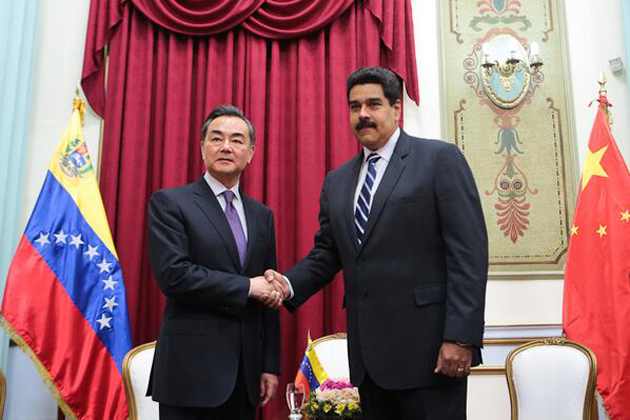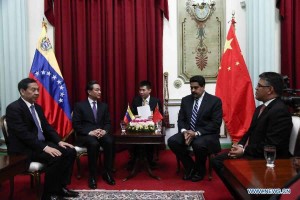
Chinese minister ends visit to Venezuela
Chinese Foreign Minister Wang Yi ended a two-day visit to Venezuela Tuesday night (April 22) and went on to Argentina, continuing a four-nation mission preparatory to a tour by President Xi Jinping next July. Wang spent Sunday in Havana; he will go on to Brazil after the stopover in Buenos Aires.
Wang arrived Monday morning in Caracas, where he met with his Venezuelan counterpart, Elías Jaua. The subjects of their talk were the relations between China and the CELAC (Community of Latin American and Caribbean States) and China and Venezuela, in terms of cooperation on finance, energy, agriculture, science and technology.
China will host a forum for CELAC members next September in Beijing.
At a meeting Monday night with Wang, President Nicolás Maduro (photo above) said that Venezuela plans to export one million barrels of oil a day to China to reciprocate the multimillion-dollar investments that China makes in Venezuela.
If that goal is reached, China would replace the United States as Venezuela’s best client. In 2013, the U.S. bought an average of 800,000 barrels of oil a day; China bought 626,000.
A Joint Chinese-Venezuelan Fund was set up in 2007 by then-presidents Hu Jintao and Hugo Chávez, enabling China to underwrite major projects in Venezuela in exchange for a steady supply of oil. One month ago, the $12 billion fund was increased by $5 billion.
Among the Chinese investments in Venezuela are a joint venture for the development of the Junín 10 Field on the Orinoco Oil Belt, an agreement to draw up a mining map of Venezuela, and a viability study for the exploitation of the Las Cristinas gold mine in the state of Bolívar.
Projects financed with Chinese money include the construction and expansion of subways in Valencia and Maracaibo, housing construction, highway repairs and expansion of ground transportation nationwide.
Trade between the two countries totaled more than $20 billion in 2012.
The recent disturbances in Venezuela were addressed by the Chinese visitor. Wang said that China is aware of the current political crisis in Venezuela and trusted the government to find a solution.

“China is paying very close attention to the evolution of the domestic situation in Venezuela,” Wang said after meeting with Jaua. “We trust that all parties in Venezuela will take into account the country’s long-range fundamental interests and press for the solution of the differences through political dialogue within a legal framework. We are convinced that Venezuela will undoubtedly follow a bright road of greater unity, stabilty and development.”
“We are confident of the ability and intelligence of the Venezuelan people to solve, in an independent and autonomous manner, the existing problems,” he told reporters, adding that China and Venezuela are “friends and partners who understand and support 21st-Century socialism.”
Wang was accompanied to his meetings with Jaua and Maduro by Zhao Rongxian, the Chinese ambassador to Venezuela and former ambassador to Cuba.
*****
Beijing comments on Maduro-Wang meeting
The Chinese Foreign Ministry on Wednesday (April 23) released the following official statement, translated here by Progreso Weekly:
On April 21, 2014, the president of Venezuela, Nicol·s Maduro, met with Foreign Minister Wang Yi in Caracas.
Nicolás Maduro said that, since the establishment of the strategic association of joint development between Venezuela and China, the cooperation in various fields has achieved considerable advances with fruitful results.
Venezuela is ready to continue the cause of friendship between Venezuela and China initiated by President Chávez and the Chinese leaders to promote Sino-Venezuelan relations and the friendly cooperation between the countries of Latin America and China.
Wang Yi stated that Venezuela is an important country in Latin America and maintains a traditional friendship with China. Both parties must seize the opportunity of the 40th anniversary of the establishment of diplomatic relations to continue the work of the predecessors and open new perspectives, deepen cooperation and create a bright future for relations between China and Venezuela.
China heartily wishes for social stability, national reconciliation, the happiness of the people of Venezuela, and hopes that Venezuela may play an evermore important role in international and regional affairs.
Wang Yi said that both China and the Latin American countries are countries on the road to development and have the same aspirations, goals and tasks. The strengthening of cooperation with Latin America constitutes an important part of China’s omnidirectional diplomacy.
The Sino-Latin American forum [CELAC] will get underway this year. China is ready to take advantage of this forum as a platform to deepen its cooperation and secure the development and common prosperity with the countries of Latin America.


